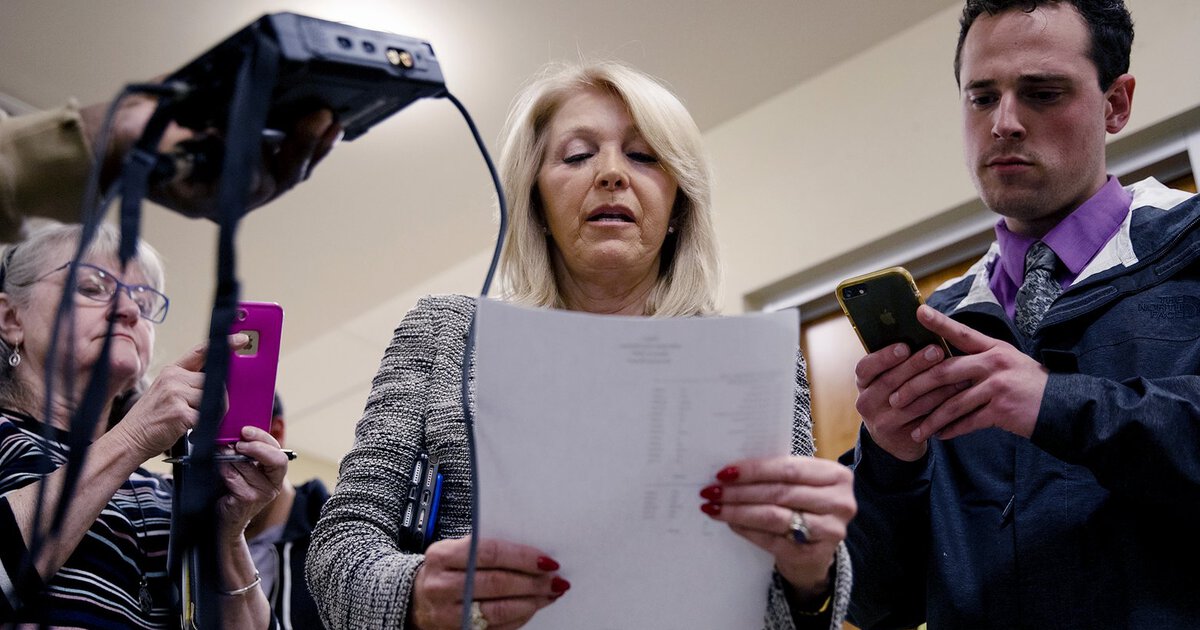Clerk who touted conspiracy theories barred from overseeing November election

A Colorado judge on Wednesday prohibited a local official who has embraced conspiracy theories from overseeing November’s election, finding she breached and neglected her duties and was “untruthful” when she brought in someone who was not a county employee to copy the hard drives of Dominion Voting Systems machines.
The effort by Mesa County Clerk Tina Peters, a Republican, to ferret out supposedly hidden evidence of fraud amounted to an escalation in the attacks on the nation’s voting systems, according to experts, one in which officials who were responsible for election security allegedly took actions that undermined that security in the name of protecting it.
Secretary of State Jena Griswold, a Democrat, filed a lawsuit in August seeking to formally strip Peters of her election duties after passwords for Mesa County’s voting machines were posted online and copies of the hard drives were presented at a symposium hosted by MyPillow executive Mike Lindell, who denies that President Joe Biden won the 2020 election.
Judge Valerie Robison found Peters and her deputy, Belinda Knisley, had falsely represented that a man named “Gerald Wood” was a county employee so he would be allowed to attend a manual software update for the Dominion machines, a closely guarded process known as a “trusted build.”
The confidential voting-machine passwords were photographed during the trusted build, Robison wrote. In addition, she wrote, Peters allowed Wood to make copies of the Dominion hard drives before and after the trusted build, and an investigation by state officials months later — after the passwords appeared online — found that two settings on a county Dominion server had been changed, giving rise to a potential security vulnerability. Dozens of pieces of election equipment had to be decertified and could no longer be used.
Robison wrote that Peters and Knisley are both “unable or unwilling to appropriately perform the duties” of the county’s chief elections official. She granted a request from Griswold and Mesa County’s commissioners to confirm Wayne Williams, a former secretary of state, as the county’s designated elections official for an upcoming vote Nov. 2.
Griswold, whose office supervises elections run by county clerks, welcomed the judge’s decision Wednesday, saying it “bars Peters from further threatening the integrity of Mesa’s elections and ensures Mesa County residents have the secure and accessible election they deserve.”
The county commissioners intervened in the case to endorse stripping Peters and Knisley of their election duties. In a statement Wednesday, Commissioner Cody Davis said that ballots in the upcoming election would be posted online and tabulated three ways to reassure voters. “There has been a large shadow cast over the integrity of our elections here in Mesa County, and we have a lot of work to do to restore that trust,” he said.
Scott Gessler, a lawyer for Peters and Knisley, had argued that Griswold did not have the power to strip them of their duties. In a statement, Peters said she is disappointed with the court’s decision and plans to appeal. She called Griswold’s lawsuit a “power grab” meant to serve as a “warning to all other potential whistleblowers.”
In recent weeks, Peters has said that she hired a “consultant” to make copies of Dominion hard drives before and after the trusted build, contending that doing so was necessary to ensure that the trusted build did not erase files needed to fully investigate the 2020 election. But when the trusted build took place in May, she introduced Wood to state officials as an administrative assistant in her office and allowed him access to elections rooms that are supposed to be restricted to employees who have undergone background checks, Robison wrote.
The local district attorney, state prosecutors and the FBI are investigating whether criminal charges are warranted in connection with the voting-machine breach.

